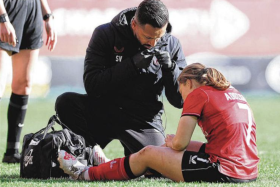Megan Rapinoe at the vanguard of women's football: Richard Buxton
United States star is a face of the women's game as it undergoes an overdue renaissance on a global scale
Megan Rapinoe is everything that Donald Trump loves to hate. The outspoken and openly gay co-captain of the United States women's team remains far removed from the chest-beating ideology that her country's president believes athletes must subscribe to.
| ENGLAND | UNITED STATES |
She stands in silent protest during the national anthem and routinely challenges injustice.
Above all, Rapinoe is a woman who will simply be neither silenced nor cowed.
A video of her blunt insistence that "I'm not going to the f****** White House" should her side retain their Women's World Cup crown has been viewed more than 11.7 million times in the past seven days, and counting.
President Trump attempted to pressure Rapinoe into backing down in a rare break from his daily Twitter diatribes.
He told her to "finish the job" before thinking about an invitation to the Oval Office and then, oddly, offering it to her and her teammates anyway.
In the current and hostile political climate, few would have blamed her for re-evaluating her stance. But the 33-year-old has continually stood up to be counted against inequality.
Rapinoe, however, is hardly a trailblazer within the women's game, even in its American chapter. She merely stands at the vanguard in a way that her predecessors Julie Foudy and Abby Wambach were unable to attain.
A return to her former parish of Lyon for tomorrow morning's (Singapore time) World Cup semi-final with England reflects an overdue renaissance of the sport on a global scale.
Phil Neville's side will also be out to prove a point. During the past 12 months, the Lionesses' influence has spread far and wide in European football.
Nikita Parris, one of their leading lights, will enjoy a first taste of life at her future stomping ground after sealing a move to the newly crowned Women's Champions League holders.
Lyon has become the key destination for the game's star names, with Parris' England teammates Lucy Bronze and Izzy Christiansen already plying their trade there, alongside the Ballon d'Or Feminin holder Ada Hegerberg, a notable absentee from this summer's Finals.
RECORD CROWDS
England strikers past and present have grown in prominence across the continent in recent months, too. In March, Toni Duggan scored in Barcelona's 2-0 win against Atletico Madrid in front of a world- record 60,739 fans at the Wanda Metropolitano.
Just seven days later, Eniola Aluko played at a sold-out Allianz Stadium as Juventus ran out 1-0 victors over Fiorentina before 39,000 in Italy's biggest crowd for women's football.
Despite such high-profile exports, there is no danger of the Women's Super League (WSL) suffering from a talent drain.
At least seven players representing English top-flight sides are also set to be involved in Thursday's other semi-final between Holland and Sweden.
Nine of the English Premier League's existing teams are mainstays of the WSL, with Manchester United, Liverpool and Arsenal among them, while Chelsea flew the flag in last season's Champions League semi-finals, before bowing out to eventual winners Lyon.
Appetite for women's football is growing abroad, too, with Real Madrid agreeing to join their La Liga counterparts in forming their own team.
Prehistoric attitudes towards women have not only hardened in the Trump years but also been empowered and, worryingly, even legitimised.
After this World Cup, the strike back against football's chauvinism will become only stronger.
Get The New Paper on your phone with the free TNP app. Download from the Apple App Store or Google Play Store now



